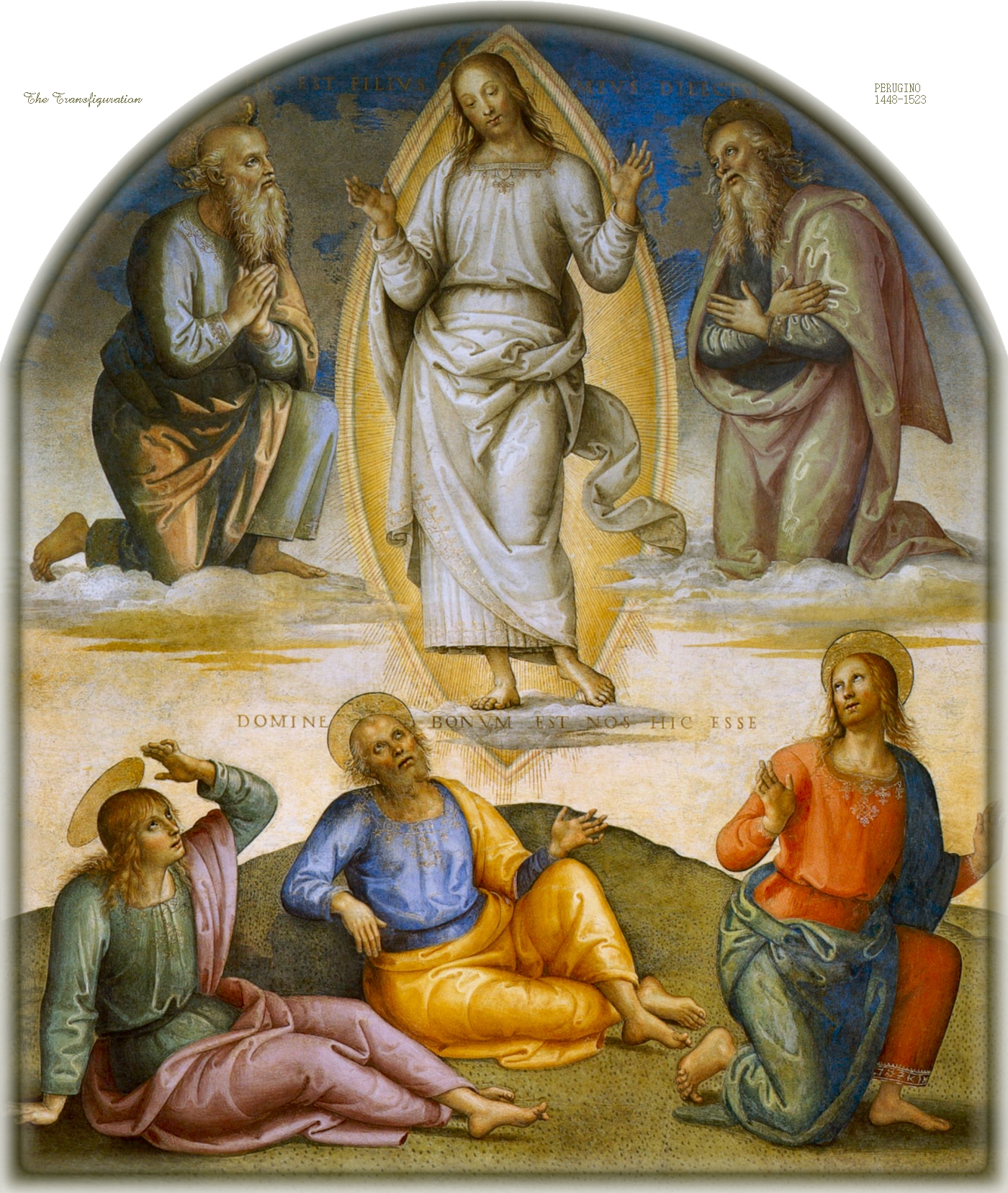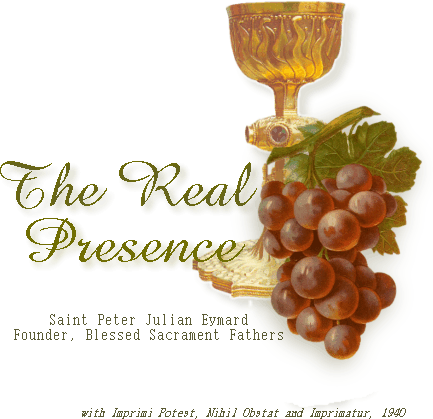

THE EUCHARISTIC TRANSFIGURATION
Et transfiguratus est ante eos.
And He was transfigured before them. (Matthew xvii. 2.)
THE feast of the Transfiguration of our Lord on Thabor is a beautiful feast. Let us say a few words about its relations to the Eucharistic transfiguration. All the mysteries have some relation to the Eucharist, for the Eucharist completes them all. They all tend toward the Eucharist; with the help of grace we must discover what is Eucharistic in the mysteries in order to nourish our devotion toward the Most Blessed Sacrament.
Our Lord took three disciples with Him and led them to a high mountain to show them His glory, which He kept hidden in the lowliness of His flesh. He was going to arm them against the scandal of His Passion, and to show them Who He really was.
Notice how the Eucharist was instituted also on a mountain, that of Sion, far more famous than that of Thabor. Jesus loved the mountains; He performed on them several of the great deeds of His life. The lowlands do not agree with Him; they are the breeding places of malaria and other diseases. The earth is for those who crawl. He therefore elevates and draws to Himself the souls He wants to love with a special love.
The second transfiguration is more lovable than the first, and much more lasting. It happened in the presence of all the Apostles. The first took place in the open air, for glory needs room for expansion. But the Eucharistic transfiguration, which is one all of love, He effected in secret; He concentrated it to make it more powerful. When we want to prove our affection to a friend, we clasp him in our arms. A zealous charity reaches far and wide to give of itself and do good to a greater number of souls. We concentrate the love of the heart on one point. We restrain it to make it stronger. We gather its rays together to focus them, just as an optician so grinds his glass as to fix on a single point all the solar rays of light and heat. Our Lord then compresses Himself in the very small space of the Host. And just as we can start a great conflagration by applying the hot focus of a lens to inflammable material, so the Eucharist enkindles those who partake of it and inflames them with its Divine fire.
On Thabor Jesus was transfigured while He prayed. His garments became white as snow, and His face shone like the sun. The Apostles could not stand the splendor of it. Jesus was transfigured in a blaze of glory to show that His body, for all its weakness, was nevertheless the body of a God. This transfiguration proceeded from the inside to the outside
One ray of the glory which Jesus held: in check by a constant miracle was allowed to appear: But Jesus was not come to teach us lessons of glory. That is why the vision of Thabor swiftly passed away; it hardly lasted more than a moment.
The sacramental transfiguration proceeds from the outside to the inside. Whereas on Thabor Jesus had rent the veil that covered His Divinity, here He conceals even His humanity and transfigures it into the appearances of bread, to the point that He no longer seems to be either God or Man, and does not act outwardly anymore. He buries Himself in the Species, which become the tomb of His faculties. Out of humility He veils His humanity which is so kind and beautiful. He is so united to the accidents that He seems to be their substance. The bread and wine have been changed into the Body and Blood of the Son of God. Do you see Him in this transfiguration of love and humility? We know that the sun exists even though a cloud hides it from us. Jesus never ceases being God and perfect Man, although hidden behind the cloud of bread and wine. Just as everything was glorious in the first transfiguration, so in the second everything is lovable. We see Him no longer, nor do we touch Him; but He is there with all His gifts. Love, grace, and faith pierce the veils and can recognize His face. Faith is the eye of the soul; to believe is really to see.
We should very much like to see Jesus in the Sacrament with our bodily eyes; but if the Apostles could not stand the brightness of a single ray of His glory, what would we do? Love knows only how to transfigure itself into a state of kindness by humbling itself, by making itself little, and by abasing itself.
Where is the greater love, on Calvary, or on Thabor? Compare the two, and tell me whether it was Thabor or Calvary that converted the world. Love rejects or conceals its glory; it prefers to humble itself. That is what the Word did at His Incarnation, what He did on Calvary, and what He does still more profoundly in the Eucharist. Instead of complaining we ought to thank our Lord for not repeating what happened on Mount Thabor. The trembling Apostles lay prostrate on the ground. Every word that came out of the mouth of God was capable of consuming them. The Apostles hardly dared speak to our Lord! But here we can speak to Him. We are not afraid; for we can place our heart next to His and feel His love.
Then again, the sight of His glory would, to say the least, make us lose our head. Remember how Saint Peter raved; he was out of his mind. He spoke of rest and happiness while our Lord talked about His sufferings and His death. He had quite forgotten about his obligations. If our Lord were to manifest His glory to us, we should refuse ever to be separated from Him. We should be so happy with Him. The Heavenly Father had to teach Saint Peter a lesson and remind him that our Lord was His Son, Whom he must follow everywhere until death. Keep in mind that an education based only on happiness is neither serious nor solid and that the child upon whom too much tenderness is lavished will never be very generous. That is why the Eucharistic transfiguration did not take place in joy or in glory, but in secret and in a state of humiliation; glory will come as a result of it.
We do not see Moses or Elias at that transfiguration; they had nothing to do with it; the Eucharist was not for them. But the twelve Apostles who were to be the lawgivers and prophets of the new people of God took part in it. The Holy Trinity was present, working invisibly. Legions Af angels adored this Word of God reduced to a state that is next to nothingness. We also were present, all of us. In His intention and foreknowledge Jesus consecrated our Hosts. He counted them; and in obedience to His command we give them to you.
But see how the prayer of a simple and upright heart is always answered, although not always in the manner expected. Peter had asked to remain on the mountain, and Jesus had refused him. . . . But no! The grace implored had merely been deferred. In His Eucharist Jesus has again pitched His tent among us forever, and He allows us to dwell with Him on His Eucharistic Thabor. Oh! It is not a tent that can be folded up and carried away over night; it is a house which He has built and in which we dwell night and day. We have much more than what Saint Peter asked for. As for you, my dear brethren, you see our Lord only in passing; but you can do so every day, and then you have taken up residence near the church of the Blessed Sacrament, and you experience the gentle influence of its nearness.
Domine, bonum est nos hic esse! "Oh! Yes, Lord! It is indeed good for us to be here!" You know very well what to do, brethren, when you are under some sorrow or difficulty! You come to Him and always find in Him a Good Samaritan. He pours the goodness of His Heart upon yours. He is waiting for you and treats you not as strangers, but as friends, as children of the family.
Did not the Heavenly Father say: "This is My beloved Son"? And out of an incomprehensible love the Father gave Him to us. He gave Him to us at Bethlehem, on Calvary, and, above all and for always, in the Cenacle at the very time Jesus was also giving Himself to us. The Father begets Him and gives Him every day to each one of us. Oh! Let us listen to Him!
Let us love this feast of the Transfiguration. It is entirely Eucharistic. Come to this hallowed mountain on which Jesus is transfigured. Do not come looking for glory or for sentimental bliss, but rather for the lessons of holiness He teaches you by His self-abasement. Come, and by your love and self-denial, be transfigured into Jesus Christ in His Sacrament while waiting to be transfigured into Jesus Christ in His heavenly glory.
 Contact Us
Contact Us
HOME---------------THE HOLY EUCHARIST DIRECTORY-----------------------BLESSED SACRAMENT VISITS
www.catholictradition.org/Eucharist/real-presence45.htm